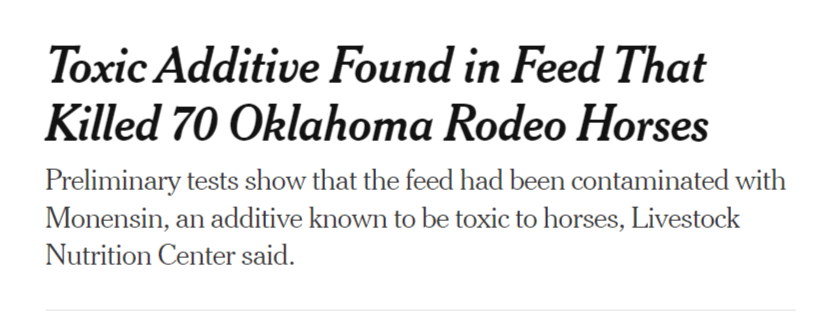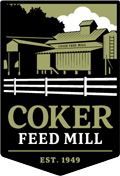Ensuring your livestock’s feed has zero contamination with harmful additives is vital, specifically with your horses. As major news channels have shared, almost 70 horses at Beutler & Son rodeo company in Kentucky tragically died due to monensin contamination (an ionophore additive) of their feed.

- Hauser, C. (2024, September 3). Toxic Additive Found in Feed That Killed 70 Oklahoma Rodeo Horses. The New York Times. Retrieved September 6, 2024, from https://www.nytimes.com/2024/09/03/us/rodeo-horses-poisoned-oklahoma-livestock.html
That’s why it’s been an important and intentional choice not to take those chances here at Coker Feed Mill. We are an ionophore-free facility, meaning we do not process or handle these ingredients that could potentially harm a horse. We go a step further to ensure we partner with vendors who use exclusive ionophore-free processing methods for our raw materials as well.
Ionophores — like monensin — are antibiotic additives commonly used for ruminants and other livestock. The intention is to promote growth and production in these animals, but since even trace amounts of ionophores in horse feed can be deadly, we opt not to go near them. We prefer more holistic practices that focus on environment, nutrition, and immune function.
If not carefully controlled, ingesting too much monensin can result in ionophore toxicosis in horses. This can result in transient anorexia, arrhythmia, digestive issues, depression, wobbly gait, irreparable damage to the horse’s cardiovascular system, and even sudden death. While veterinarians can initiate symptomatic and supportive care, there is no antidote for ionophore poisoning.
Signs and symptoms of ionophore poisoning in horses depend on the amount ingested, but can include irregular heartbeats, breathing trouble, weakness, and depression.
If you suspect your feed may be contaminated by ionophore additive, it’s recommended to:
- Stop feeding the suspected horse feed immediately and remove access to it from any horse.
- Isolate the affected horse and contact your veterinarian immediately. You can explain the situation and receive guidance.
- Sample your current feed and send it for testing. Replace your feed immediately with products made in ionophore-free facilities.
- Monitor your horse for any further deterioration. Note any changes.
Our hearts go out to Beutler & Son for their heart-breaking loss. Ensuring your horse feed provider is using ionophore-free production and processing methods is crucial to keep your horses healthy and productive.
If you have any questions about our feed and production process, our office stands ready to answer your questions.
For horse owners, rodeos, or farms that want to know how to transition their horses to feed processed at an ionophore-free facility, we have a step-by-step process to make it happen smoothly and quickly. Please reach out using the ‘Contact Us’ tab on our website or call directly at 800-332-6237.

